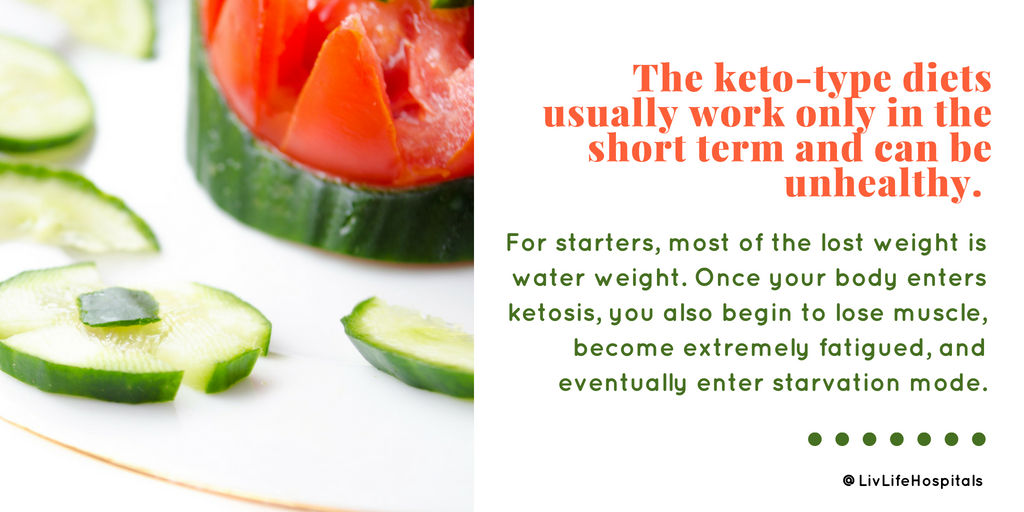
Jul
The Negative Side Effects of Extreme Diets –
Diets don’t come with warning labels that educate us about the potential risks of our ventures. No one rattles off, even quickly or quietly, what may happen if we aggressively restrict our food intake. But just like restricting oxygen by holding our breath, we cannot aggressively “under eat” for long without some gasping. According to the National Institute of Nutrition, adults should consume from 1,200 to 2,600 calories per day depending on their gender, age, and activity level. Many extreme diets encourage people to lose weight through calorie restrictions that fall well below these requirements. If you’re considering an extreme diet, you should ensure that you have a full understanding of the health risks and side effects of cutting calories and restricting your food choices.
The current and trending new fad diet being peddled, promises losing weight and also helps in reversing type 2 diabetes. It claims to shed 30 kilos in less than three months following a diet that was devised.
And what is this diet? It’s a K.E.T.O. diet.
Embarking on a diet based on four pillars: a) 70 to 100 grams of fat; b) 3 lemons; c) 4 litres of water and d) one vitamin tablet a day , is all that is recommended in this diet for slashing down the extra pounds.
You might have heard that following this diet can help you lose weight fast. But that’s not the only thing that can happen when you drastically slash your carbs and up your fat and protein. Indeed, there are some keto diet side effects that you aren’t aware of. Some of them are positives, but a few could be unpleasant—or even dangerous. Here’s what you should know before starting the diet. Even though most diets respect the most nutrition and health rules, certain eating plans tend to bypass these same rules by offering less daily calories, activity, allowed food groups, or requiring a lot more time to be spent on meal preparing, all in the name of fast weight loss.
These diets are labeled extreme due to promoting calorie restrictions, which can easily lead you to many issues much worse than being overweight. The keto-type diets usually work only in the short term and can be unhealthy. For starters, most of the lost weight is water weight. Once your body enters ketosis, you also begin to lose muscle, become extremely fatigued, and eventually enter starvation mode. Then it actually becomes even harder to lose weight. Anyone with type 2 diabetes can benefit from weight loss and a reduced-carb diet because it will improve insulin sensitivity. But there are many other ways to do it besides a fad diet that won’t keep weight off long-term.

Short-Term Side Effects of Extreme Diets
There are several short-term side effects that are most evident at the beginning of therapy, particularly when patients commence the diet with an initial fast.
Hypoglycemia is a common side effect in this instance, and noticeable signs may include:
- Excessive thirst
- Frequent urination
- Fatigue
- Hunger
- Confusion, anxiety and/or irritability
- Tachycardia
- Lightheadedness and shakiness
- Sweating and chills
Additionally, patients may also experience some constipation and low-grade acidosis. These effects tend to improve when the diet is continued, as the body adapts to the new diet and adjust the ways in which it sources energy.
Alteration in Blood Composition: As a result of the changes in dietary consumption and the body’s adaptive mechanisms to cope with the reduced carbohydrate intake, there are several changes in the blood composition of individuals following the ketogenic diet. In particular, the levels of lipids and cholesterol in the blood are commonly higher than what is considered to be normal. More than 60% of patients have raised lipid levels and more than 30% have high levels of cholesterol.
Long-Term Side Effects of Extreme Diets
When the ketogenic diet is continued for extended periods of time, there are other adverse effects that become more evident and have a greater impact on individuals.
Kidney stones, also known as nephrolithiasis, are a common complication for children following the diet, with approximately 5% of patients suffering from the condition. It is, however, treatable and the current recommendations suggest that the diet should be continued. The formation of kidney stones is believed to be linked to hypocitraturia and hypercalciuria, when acidosis causes the bone to demineralize. Additionally, low pH in the urine can encourage the formation of crystals and, eventually, kidney stones.
Children following the ketogenic diet may be affected by stunted growth, due to reduced levels of insulin-like growth factor 1. This hormone usually plays an important role in the growth of children and is reduced as a result of the diet. For this reason, patients have an increased risk of stunted growth.
Related Links: Consult a Nutritionist now for a perfect Diet
Additionally, patients have an increased risk of bone fractures. This arises from the altered levels of insulin-like growth factor 1 and the effects of acidosis. Acidosis leads to the erosion of bone, weakening the bones and leaving them prone to fractures.

Sorry, the comment form is closed at this time.